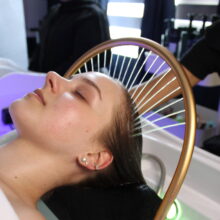9 Tips to Ease the Itch of Eczema
- Published: Thursday, October 9th 2014
- in Living Well
 For the longest time I assumed I just had dry skin that nearly no moisturizer could fix, until a dermatologist took one look at my leg and told me I had eczema, making me one of the over 30 million Americans that have it. To top things off, I had been making things worse by using soaps and lotions with artificial, overpowering fragrances, plus a handful of other things that I would have never expected could be so damaging to my skin. Dr. Marina Peredo, an associate clinical professor of dermatology at Mount Sinai Hospital in New York and founder of Spatique Medical Spa, shared the following list of tips to help ease the itch and pain associated with eczema:
For the longest time I assumed I just had dry skin that nearly no moisturizer could fix, until a dermatologist took one look at my leg and told me I had eczema, making me one of the over 30 million Americans that have it. To top things off, I had been making things worse by using soaps and lotions with artificial, overpowering fragrances, plus a handful of other things that I would have never expected could be so damaging to my skin. Dr. Marina Peredo, an associate clinical professor of dermatology at Mount Sinai Hospital in New York and founder of Spatique Medical Spa, shared the following list of tips to help ease the itch and pain associated with eczema:
1. Take warm baths instead of hot showers. Warm baths are less drying.
2. Adding in Epsom salts will help provide anti-microbial and anti-inflammatory properties. The extra bonus? Relaxation! Epsom salt baths help soothe and relax the muscles, so tension is eased. Stress is a major component in eczema flare ups so relaxation is key to managing the problem.
3. Using a very gentle cleanser that maintains the skin’s barrier is important. Try Eau Thermale Avene’s Cold Cream Ultra Rich Cleansing Bar. This is the same cleansing bar that is used for all the patients who suffer from atopic dermatitis at the Hydrotherapy Center in Avene, France.
4. After bathing, pat the skin dry and avoid rubbing vigorously with a towel. Make sure to apply a highly nourishing and moisturizing product within 3 minutes while skin is still damp to lock in moisture. Aveeno Skin Relief Moisture Repair Cream is specifically formulated for dry, itchy skin.
5. Look for moisturizing ingredients such as ceramides, petrolatum, and shea butter to help reduce trans-epidermal water loss and restore the skin’s natural moisture barrier. As well as a light amount of an alpha hydroxy acid can help minimize the dry, itchy plaques. Try CeraVe SA Renewing Cream which contains salicylic acid in addition to Vitamin D.
6. Look for ointments and creams instead of serums and lotions. Always opt for a fragrance free product.
7. Have your Vitamin D levels checked. Recent clinical studies have shown that there may be a link between Vitamin D deficiencies and atopic dermatitis.
8. Avoid tight fitting, rough, scratchy clothing. Instead of wool, opt for cotton.
9. Visit your dermatologist to determine whether the use of prescription-strength products are necessary to help you manage your eczema.


